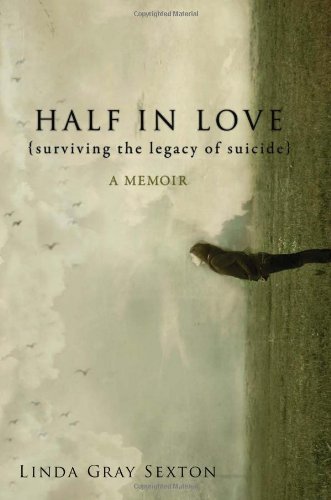 Today it is my great pleasure to welcome author Linda Gray Sexton back to Colloquium. I urge you to read Linda’s guest post, The Business of Writing Memoir in which she discussed her memoir, Half in Love.
Today it is my great pleasure to welcome author Linda Gray Sexton back to Colloquium. I urge you to read Linda’s guest post, The Business of Writing Memoir in which she discussed her memoir, Half in Love.
I jumped at the chance to bring Linda back to Colloquium and again spotlight Half in Love because I was so impressed with both her work and the importance of her story. In Half in Love, Linda details the struggles her mother, Pulitzer Prize-winning poet Ann Sexton, endured with alcoholism, depression, anxiety, and manic episodes that led to multiple suicide attempts and resultant hospitalizations, and, eventually, her suicide at the age of 45. In the aftermath, Linda waged her own battles against guilt, depression, and self-mutilation (cutting) before coming to terms with the legacy of suicide that can exist within families. The story of her painful journey is difficult to read, but imbued with healing and hope.
The Fire of Suicide

Guilt leads to blame. Early in 2011, I wrote about this duet of emotional reactions for my own website. I named the post Guilt: The Inevitable Emotion. Though one would imagine that writing about a subject once would provide some sort of emotional catharsis — apparently it does not.
How is it that I return to the subject one more time, like a child running laps around the mulberry bush, creating an endless circle for myself? As part of an interview for another literary blog, I was asked: Is it inevitable that the families left behind after a suicide experience guilt? Will they always be asking themselves for answers, yearning to know if there was something more they could have, or should have, done?
Part of why I wrote my latest memoir, Half in Love: Surviving the Legacy of Suicide, (published in hardcover by Counterpoint Press in January 2011, and coming out in paperback January 2012), is that I had always blamed myself for my mother’s suicide, even though I had been only twenty-one and a college senior. She was a Pulitzer Prize-winning poet, and had appointed me her literary executor immediately before her death. It was a job I didn’t want. For so long, I had dealt with her difficult life and her suicide attempts. I didn’t want another task that would involve me with her again, so intimately and so completely — from personality to poetry.
When she died, I had a multitude of reactions: anger, grief, relief, a near sense of giddiness, sadness, depression. The list could go on and on, some of the emotions embarrassing ones, others predictable. But to me the most interesting is the one I have had the most difficulty laying to rest: guilt. Was it somehow my fault that she had at last succeeded in killing herself?
I had spent the afternoon of her suicide in my college dorm room, reading for my thesis on Virginia Woolf’s To The Lighthouse, unaware of the news that was about to crash into my life. Back at home, my mother had lowered the garage door, locked herself into her car, and turned the ignition key. When my telephone rang some three hours later, I went into shock. Later that evening, I would pick up her red telephone book and begin making the calls that would tell others of her suicide. Her best friend accused me then, in a voice steeped in pain: “It’s your fault, you know. It’s all your fault.”
For a long time I believed that it was. But ultimately, having my own children and then once again taking up the reins of my own life, I learned that it was not — any more than it was my children who were to blame when it was my turn to assume the mantle of the suicidal parent. I came to the conclusion that there was no one to blame other than myself when it came to my own commitment to life or death. Half in Love is all about taking the responsibility for my depression and my suicide attempts. It is about how I made the transition into recovery and how I learned to accept myself again. It is about how I put my own survivor guilt to rest.
When I published Half in Love, I received emails from so many people who confessed that they were angry with a loved one who had committed suicide, or who had even tried to do so, or with those who were just plain old depressed. On some level they blamed themselves, and that blame made them angry, because it was unjust. When they told me of their feelings, I tried to reassure them that it was okay to feel both guilt and anger toward the suicidal member of the family, or the friend. It was natural. Someone important to them had purposely taken themselves away, somewhere they could not follow — how could you not be angry about that?
As I was growing up, moving through childhood into adolescence, my mother’s various psychiatrists never counseled my family that our anger and grief were normal. We were told not to be angry, but to be patient and loving. This wasn’t realistic and it wasn’t supportive. We needed someone to tell us that our anger was appropriate. And when my mother finally died, we needed someone to hold our hands through the process of resolving that anger and learning to accept her suicide.
And so when I get those emails from guilty and grieving family members, I tell them what I always wished I had heard back then, some thirty-seven years ago: that the guilt and the anger show us how much your mother, father, sister, brother, son or daughter meant to you. Over time, your negative feelings will dim, as did my own, and you will be left only with the pleasure these people once brought to you. Never let it go.
Connect with Linda on her website.
Click here to read my review of Half in Love (Surviving the Legacy of Suicide).
Enter to Win a Copy of Half in Love
Author Linda Gray Sexton has graciously provided one copy of Half in Love (Surviving the Legacy of Suicide) to be awarded to a lucky Colloquium reader.
To enter, post a comment in which you answer this question:
What aspect of my review of Half in Love (Surviving the Legacy of Suicide) most intrigues and inspires you to read the book?
Register your entry utilizing the Rafflecopter widget. Bonus entries also available, as indicated.
Thank you, Linda!
Thanks also to Julia Drake Public Relations.



9 Comments
The aspect of this story (mentioned in your review) that most intrigues me is that willpower was not enough to overcome the illness. Many times, people judge unfairly–saying ‘Why don’t you just…’
The reactions to her mother’s death which are all normal and expected. How she continued to live a healthy life and realize that she was not at fault.
The subject matter is interesting-even self-mutilation.
This book sounds really interesting. I am interested to read more about how the author dealt with her mother’s mental illness and suicide while the mother was so well loved for her talent as a writer.
I am most interested in reading this because it is a subject matter very close to my family. There have been several suicides in my family and my mother suffers from severe depression so I will definitely be able to relate to the author.
Your review was great! What especially interested me, was the impact that suicide had on all the family members! It wasn’t a single event, but had lasting and myriad effects.
How you put your own survival guilt to rest and learned to know it was not your fault. No matter what you say or do it is how the individual feels that is how it will play out no matter how much we tell them we love them.
When my husband was still my fiance, his best friend committed suicide while he was deployed with the Navy in the Middle East. That was the most difficult phone call I’ve ever had to make. It’s a difficult situation to come to terms with.
I want to read this book so bad. I just can’t wait to get my hands on it.